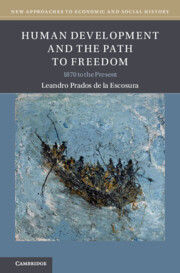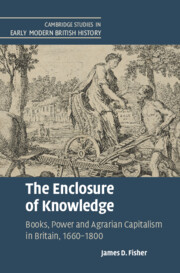Refine search
Actions for selected content:
26946 results in Economic history
Chapter 7 - The Master Should Know More
-
- Book:
- The Enclosure of Knowledge
- Published online:
- 07 July 2022
- Print publication:
- 21 July 2022, pp 229-262
-
- Chapter
- Export citation
Abbreviations
-
- Book:
- The Enclosure of Knowledge
- Published online:
- 07 July 2022
- Print publication:
- 21 July 2022, pp xiii-xiv
-
- Chapter
- Export citation
Figures
-
- Book:
- The Enclosure of Knowledge
- Published online:
- 07 July 2022
- Print publication:
- 21 July 2022, pp viii-viii
-
- Chapter
- Export citation
Index
-
- Book:
- The Enclosure of Knowledge
- Published online:
- 07 July 2022
- Print publication:
- 21 July 2022, pp 326-330
-
- Chapter
- Export citation
Appendix
-
- Book:
- The Enclosure of Knowledge
- Published online:
- 07 July 2022
- Print publication:
- 21 July 2022, pp 276-293
-
- Chapter
- Export citation
Acknowledgements
-
- Book:
- The Enclosure of Knowledge
- Published online:
- 07 July 2022
- Print publication:
- 21 July 2022, pp x-xi
-
- Chapter
- Export citation
Chapter 2 - Learning without Books
-
- Book:
- The Enclosure of Knowledge
- Published online:
- 07 July 2022
- Print publication:
- 21 July 2022, pp 60-88
-
- Chapter
- Export citation
Bibliography
-
- Book:
- The Enclosure of Knowledge
- Published online:
- 07 July 2022
- Print publication:
- 21 July 2022, pp 294-325
-
- Chapter
- Export citation
Dedication
-
- Book:
- The Enclosure of Knowledge
- Published online:
- 07 July 2022
- Print publication:
- 21 July 2022, pp v-vi
-
- Chapter
- Export citation
Chapter 5 - Dividing Head and Hand
-
- Book:
- The Enclosure of Knowledge
- Published online:
- 07 July 2022
- Print publication:
- 21 July 2022, pp 170-204
-
- Chapter
- Export citation
Notes
-
- Book:
- The Enclosure of Knowledge
- Published online:
- 07 July 2022
- Print publication:
- 21 July 2022, pp xii-xii
-
- Chapter
- Export citation
Contents
-
- Book:
- The Enclosure of Knowledge
- Published online:
- 07 July 2022
- Print publication:
- 21 July 2022, pp vii-vii
-
- Chapter
- Export citation
Copyright page
-
- Book:
- The Enclosure of Knowledge
- Published online:
- 07 July 2022
- Print publication:
- 21 July 2022, pp iv-iv
-
- Chapter
- Export citation

Human Development and the Path to Freedom
- 1870 to the Present
-
- Published online:
- 14 July 2022
- Print publication:
- 28 July 2022

The Enclosure of Knowledge
- Books, Power and Agrarian Capitalism in Britain, 1660–1800
-
- Published online:
- 07 July 2022
- Print publication:
- 21 July 2022
Dedication
-
- Book:
- Foreign Banks and Global Finance in Modern China
- Published online:
- 22 June 2022
- Print publication:
- 07 July 2022, pp v-vi
-
- Chapter
- Export citation
Appendices
-
- Book:
- Foreign Banks and Global Finance in Modern China
- Published online:
- 22 June 2022
- Print publication:
- 07 July 2022, pp 277-287
-
- Chapter
- Export citation
Acknowledgements
-
- Book:
- Foreign Banks and Global Finance in Modern China
- Published online:
- 22 June 2022
- Print publication:
- 07 July 2022, pp xi-xiv
-
- Chapter
- Export citation
6 - Disentanglement and Liquidation
-
- Book:
- Foreign Banks and Global Finance in Modern China
- Published online:
- 22 June 2022
- Print publication:
- 07 July 2022, pp 229-264
-
- Chapter
- Export citation
1 - A German Bank in China
-
- Book:
- Foreign Banks and Global Finance in Modern China
- Published online:
- 22 June 2022
- Print publication:
- 07 July 2022, pp 24-55
-
- Chapter
- Export citation
